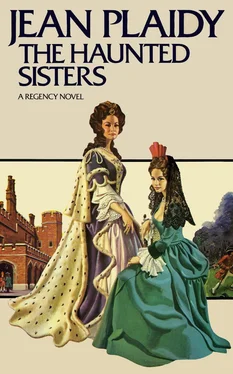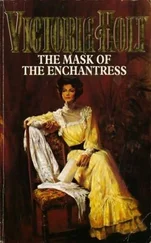Виктория Холт - Royal Sisters - The Story of the Daughters of James II
Здесь есть возможность читать онлайн «Виктория Холт - Royal Sisters - The Story of the Daughters of James II» весь текст электронной книги совершенно бесплатно (целиком полную версию без сокращений). В некоторых случаях можно слушать аудио, скачать через торрент в формате fb2 и присутствует краткое содержание. Жанр: Исторические любовные романы, на английском языке. Описание произведения, (предисловие) а так же отзывы посетителей доступны на портале библиотеки ЛибКат.
- Название:Royal Sisters: The Story of the Daughters of James II
- Автор:
- Жанр:
- Год:неизвестен
- ISBN:нет данных
- Рейтинг книги:3 / 5. Голосов: 1
-
Избранное:Добавить в избранное
- Отзывы:
-
Ваша оценка:
- 60
- 1
- 2
- 3
- 4
- 5
Royal Sisters: The Story of the Daughters of James II: краткое содержание, описание и аннотация
Предлагаем к чтению аннотацию, описание, краткое содержание или предисловие (зависит от того, что написал сам автор книги «Royal Sisters: The Story of the Daughters of James II»). Если вы не нашли необходимую информацию о книге — напишите в комментариях, мы постараемся отыскать её.
Royal Sisters: The Story of the Daughters of James II — читать онлайн бесплатно полную книгу (весь текст) целиком
Ниже представлен текст книги, разбитый по страницам. Система сохранения места последней прочитанной страницы, позволяет с удобством читать онлайн бесплатно книгу «Royal Sisters: The Story of the Daughters of James II», без необходимости каждый раз заново искать на чём Вы остановились. Поставьте закладку, и сможете в любой момент перейти на страницу, на которой закончили чтение.
Интервал:
Закладка:
Devonshire was demanding action. “Does Torrington realize that the fate of three kingdoms is in his hands? Torrington must be replaced.”
“Make him a prisoner,” cried Russell.
“No, no,” interjected Marlborough. “That would please the enemy too much and put heart into them.”
Mordaunt said: “Let me go to him. I will engage the Frenchmen and drive them off … or die in the attempt.”
That someone should go was finally agreed by the Council and Mordaunt and Russell left.
In the privacy of her own apartment Mary awaited news with trepidation, feeling that disaster was very close indeed. She was unsure, and could only pray that the actions she took were the right ones.
She did not trust Mordaunt and wondered what he would do when he reached Torrington. Russell was the most outspoken of the ministers; he was coarse and crude but she believed trustworthy; and trustworthiness was a very desirable quality at such a time.
She could only find comfort in writing to William to tell him that she faced dire trouble at home as doubtless he did in Ireland. But she was far more anxious, she would have him know, for his dear person than for her own poor carcass.
“I can say nothing, but pray to God for you, and my impatience for a letter from you is as great as my love, which will not end but with my life.”
Before Mordaunt and Russell set out Mary had sent an order to Torrington to engage the enemy; and this he did, in his own way, before it was possible for the two ministers to reach him.
He attacked; or at least commanded the Dutch to do so, and this they did valiantly, but were so outnumbered that they could not hope for success. Many ships were disabled and Torrington’s contribution was to leave the Dutch to the enemy while he towed the damaged ships to the Thames mouth in order to blockade it.
There was utter defeat. The navy—Britain’s pride—had let her down shamefully; and England lay at the mercy of the invader. The French were at her coast. Torrington was locked up with the fleet in the estuary of the Thames; and while the King was in Ireland the Jacobites, who may well have been waiting for this opportunity, could now rise—and who knew who would support them?—and bring back James.
Marlborough, thank God, was at hand. He could, better than any man, protect his country should an invasion be attempted—if he would. But what of Marlborough, who could, Mary was sure, jump this way and that with agility? It would depend of course on which attitude would best serve Marlborough.
She felt that she had reached the very depth of despair, but two events, following closely on one another, brought fresh hope; and she believed them to be an answer to her prayer.
She was in her apartments writing a letter to William—for her only solace was in writing to him—when the Countess of Derby came to tell her that the Earl of Shrewsbury was asking to see her.
As Charles Talbot, Earl of Shrewsbury came into the room, Mary’s spirits lifted. He would have been extremely handsome—perhaps the handsomest man at Court, now Monmouth was gone—but for a blemish in one eye. Even so, he had been called “The King of Hearts”; it was said that women loved him on sight, but he had never taken advantage of that, being gentle and retiring. He would be faithful, Mary was sure, to a woman … or a cause.
His character had begun to show in his face for he was almost thirty now; gentleness blended well with the features which could almost be called beautiful; delicacy was there; his enemies might call it nervousness.
He did not enjoy good health, and this was the reason he had not been a member of the Council. Strange that an old man like Danby clung to office; and a young one like Shrewsbury pleaded ill health in order to stay out of it.
They had been children together for he was only a few years older than Mary, but there was a stronger bond than age and similar environment between them. When Mary had been a child she had constantly heard scandals about her father’s affairs with women and there was one—the case of Margaret Denham whose husband had murdered her because of her association with James—which had shocked her deeply. Shrewsbury had suffered a similar shock when his mother’s lover, the Duke of Buckingham had killed his father in a duel because of his mother; and then created a scandal by living openly with her.
Both Shrewsbury and Mary had been deeply affected by the adulterous intrigues of their parents. Mary had sought companions of her own sex until marriage with William had made her build up an ideal so that she convinced herself that she adored her husband. Shrewsbury wanted to shrink from the world of intrigue and responsibility, which was difficult for a man in his position. He had become abnormally interested in his health and whenever a situation from which he flinched arose he would invariably become ill and make this the excuse of his retirement from it.
This was what had happened when William announced his intention of leaving England for Ireland. Shrewsbury, contemplating those who would have been his fellow councillors, had no wish to be in office; and to the chagrin of William and the disappointment of Mary he had pleaded “the comfortless prospect of very ill health.”
And now here he was, looking serious but determined; and the most attractive man Mary had seen—since she last saw him.
“Charles!” she cried affectionately.
He knelt. “Your Majesty.”
“Rise and welcome. I am pleased to see you. You are in better health?”
“Your Majesty, I could not lie abed while you are in such straits. I have come to offer you my services in whatever capacity you wish to use them.”
She began to smile; she was beautiful when animated and as the strain of the last days dropped from her she was young again.
“That makes me very happy,” she said. “I have great need of friends whom I can trust.”
Meanwhile William had arrived in Ireland. He was more melancholy than usual, for the climate did not suit his health, being even more damp than that of England. He said grimly to the Earl of Portland, who had been Bentinck, that he would give much to be back in London, even Whitehall; and having tested this climate he wondered why he had ever cursed the other.
Portland replied that he must guard his health; it was all important that he should not be sick at this juncture.
William nodded grimly; his hemorrhoids were very painful after so many hours in the saddle, but riding was good for his asthma—or would have been in a better climate.
“You should rest more frequently,” chided Portland.
“There is no time for resting. You know that well, Bentinck. We must go with all speed to Belfast to take over from Schomberg. How long do you think the army can hold out with inadequate food, and with all the disease there is among them? What do you think they are saying of a King who stays in London while they fight his battles for him. They may not like me—these English; but to see me here, fighting with them, one of them, will put heart into them, I promise you.”
Portland smiled at him affectionately. Many would be astonished that William could be almost garrulous in his company when he merely snapped out a word or two with almost everyone else.
“You will do it,” he said. “More than that you’ll conquer Ireland.”
“I have to. If not, James will be back in England. There are many who won’t have him and many who will. That will mean bloodshed, Bentinck. We don’t want it. That is why I have come to Ireland to stop his chances of ever making a bridgehead from here to England. I may die in the attempt, but at least I am going to put everything I have into driving him right off this island.”
Читать дальшеИнтервал:
Закладка:
Похожие книги на «Royal Sisters: The Story of the Daughters of James II»
Представляем Вашему вниманию похожие книги на «Royal Sisters: The Story of the Daughters of James II» списком для выбора. Мы отобрали схожую по названию и смыслу литературу в надежде предоставить читателям больше вариантов отыскать новые, интересные, ещё непрочитанные произведения.
Обсуждение, отзывы о книге «Royal Sisters: The Story of the Daughters of James II» и просто собственные мнения читателей. Оставьте ваши комментарии, напишите, что Вы думаете о произведении, его смысле или главных героях. Укажите что конкретно понравилось, а что нет, и почему Вы так считаете.









